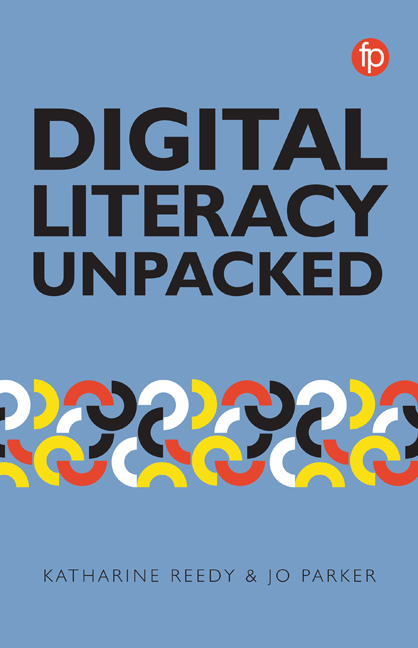Book contents
- Frontmatter
- Contents
- List of figures and case studies
- Foreword
- Notes on Contributors
- Introduction
- Part I Approaching Digital Literacy
- Part II Learning in a Digital World
- Part III Developing Staff Digital Literacies
- Part IV Digital Citizens and Workers
- 11 Digital Literacy and Open Educational Practice: Digilit Leicester
- 12 Transforming the Workplace Through Digital Literacy
- 13 Critical Digital Literacy Education in the ‘Fake News’ Era
- 14 Onwards! Why the Movement For Digital Inclusion has Never Been More Important
- Conclusion
- Index
11 - Digital Literacy and Open Educational Practice: Digilit Leicester
from Part IV - Digital Citizens and Workers
Published online by Cambridge University Press: 24 September 2019
- Frontmatter
- Contents
- List of figures and case studies
- Foreword
- Notes on Contributors
- Introduction
- Part I Approaching Digital Literacy
- Part II Learning in a Digital World
- Part III Developing Staff Digital Literacies
- Part IV Digital Citizens and Workers
- 11 Digital Literacy and Open Educational Practice: Digilit Leicester
- 12 Transforming the Workplace Through Digital Literacy
- 13 Critical Digital Literacy Education in the ‘Fake News’ Era
- 14 Onwards! Why the Movement For Digital Inclusion has Never Been More Important
- Conclusion
- Index
Summary
Introduction
Governments internationally are increasingly aware of the need to equip citizens with the skills and confidence necessary to benefit from and contribute to societies that can be characterised as ‘digital’. The UK, along with many other countries, is facing challenges regarding digital literacy: understanding and sharing a definition of digital literacy; supporting people of all ages in the development of competencies considered to be beneficial or even essential; and addressing the risk that digital societies pose of exclusion and exacerbating social inequality.
The DigiLit Leicester project represents a novel and significant approach to addressing these wider issues in situ, locally and practically. The project was designed to enable schools to get the most out of their investment in technology and to support their aspirations to raise achievement, connect communities and open up opportunities to all. Fundamental to this was working with educators to develop their digital literacy knowledge, skills and practice, in order to enable the effective use of digital tools, environments and approaches with learners. Several of the approaches introduced by the project have gone on to influence and be adopted by government at national and international level. For example, the Digital Literacy Framework developed as part of the project directly informed the Welsh government's Digital Competence Framework (Learning Wales, 2016) and the European Schools Digital Competency Framework (Redecker and Punie, 2017).
Digital literacy
Mobile and web-based technologies are now mainstream, embedded into the fabric of our social, economic and cultural lives. Digital tools and environments play an important everyday role in how lives are lived – in how families, friends and communities come together, in the buying and selling of goods and services, and in political processes and protest. Access to or ownership of devices has become a marker for inclusion in mainstream life. Alongside the importance of access and connectivity, digital literacy is increasingly recognised as being as important to citizens as literacy and numeracy (House of Lords Select Committee on Digital Skills, 2015).
What digital literacy is, or how it can best be supported, is still a contested concept. The approach taken by the DigiLit Leicester project is that digital literacy is not best understood as either an abstract concept or a fixed set of skills, but makes most sense – and is best supported – in the context of practice and identity.
- Type
- Chapter
- Information
- Digital Literacy Unpacked , pp. 155 - 168Publisher: FacetPrint publication year: 2018



